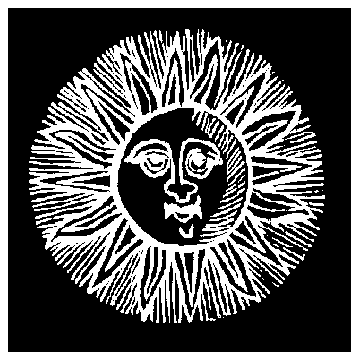Return
A Modern Quest
For Eternal Truth
Sharon Janis
(Blue Dove)
We are spiritual beings having a human experience.

For one thing, Janis believes in the simple declarative sentence, and it makes her story easy to read. I mean, how many kids do we know who grew up in a family unwanted --- parents totally disinterested in being parents --- so, after a harrowing childhood of insults and inattention, she goes off to try the usual heavy drugs (she stated that some of her best high school work was done on amphetamines, which she shared with her mother), then, once in college, dumps it all to do holy work direct from the East. After ten years of that, it's off to Hollywood to become an award-winning producer of children's television programs.
It's a good story, and for those of us who are interested in what exactly goes on in those ashrams, it's hard to put down. And --- if we believe her, and there's little reason not to --- it is just what you'd think it is, only better: moments of total ecstasy, followed by petty battles with other ashramites, alternating encouragement, love, paradox, and caustic insult from the masters. Few writers so far have told the tale of what it is like to live and study, heart and soul, with the likes of Muktananda.
Janis certainly conveys the ecstasy of it. This was what happened after swami gave her her spiritual name of Kumuda:
- As I sat down, the strangest things happened. It was as though someone had inserted a big straw into me, blowing me up like a helium balloon. I felt my body getting bigger and bigger, really fast, and really big. I expanded to fill the whole room. I kept expanding and growing, until I seemed to encompass the whole city, and then more. I knew this was impossible, yet I was experiencing it clearly, not in a dream state...
Or this, during a night of chanting Sanskrit holy verses,
- One of the first things to arise was a sensation of hot fire, blazing from just above my groin area to the middle of my stomach. It was real, tangible heat. It was not like I was visualizing some flames and interpreting them as energy. It was hot. It was fire. Sometimes the sensation would last for as long as five minutes...
For many years afterward, I had a different experience of the energy. While chanting away, all of a sudden I would get an inner signal that the pot was full. I didn't know quite what this container was or where it existed. There was just a sense that the energy had built up somewhere in my midsection, in a subtle energy co-body. Sitting cross-legged, I would put the chanting book down, hold on to both of my knees, and pull up, hunching my back slightly. My head would be facing downward, as the explosion took place. The energy would shoot up into my head, and out to my fingers and toes. My entire body would be ablaze. As it lit up my head, I would be consumed by a deep, throbbing vibration, and move into nothing nowhere-ness. My mind would become intoxicated with bliss, and I would disappear.
 Despite its honesty and ecstasy, there are a few pieces missing in the tale that is Never To Return. The story of her parents, married, not wanting to be married, parents, not wanting to be parents --- barely caring for their two daughters, is, as she tells it, fairly funny, but there is...what?...no sense of closure. Janis seems to detest mother and father, but, as we know, this isn't the answer. We are all --- all of us --- abused as children, even those of us who grew up in nearly perfect family situations. Because it is, by definition, loss-of-innocence, it's the nature of childhood for us to have some abuse in there, somewhere.
Despite its honesty and ecstasy, there are a few pieces missing in the tale that is Never To Return. The story of her parents, married, not wanting to be married, parents, not wanting to be parents --- barely caring for their two daughters, is, as she tells it, fairly funny, but there is...what?...no sense of closure. Janis seems to detest mother and father, but, as we know, this isn't the answer. We are all --- all of us --- abused as children, even those of us who grew up in nearly perfect family situations. Because it is, by definition, loss-of-innocence, it's the nature of childhood for us to have some abuse in there, somewhere.
What we do with this is the key to how we handle the rest of our lives. You can brood on it, laugh at it, or just stuff it away. Since Janis is a good writer, she can make us begin to believe that it's impossible to forgive. But not-resolving it doesn't work --- her religion certainly doesn't permit it. By not finishing the parential love-hate trip, she (and the reader) are left holding the bag, a bag filled with snakes and worms and other unpleasant creatures.
The other missing element in the tale of her life is love. There seems to be a powerful love for her two masters, but, outside of that...zilch. She doesn't admit to any passionate love affairs when she was young. She also claims to have never tried sex when growing up because one of her friends advised her against it. But this assertive statement doesn't quite jibe, at least in the context of Never To Return, for we have been given an active and a curious individual: one who seems to be willing to experiment with damn near everything under the sun --- hypnotherapy, peyote, amphetamines, pot, suicide, running off to study Eastern religions --- and yet, she tells us, she never gave sexuality a whirl, much less had a love-affair, falling in love, going crazy with that part of the human psyche.
There is love for her gurus; in fact, the passion she gives to her gurus is considerable; in fact, comes close to wretched excess, especially her humble, non-questioning acceptance of Master #2 --- a woman (never named) who seems capable of outright perfidy, cynical manipulation, and playing off one follower against others. For example, at one point, the teacher turns to her and says, "You're jad!" --- then turns to the other students, and repeats it (it means that Janis is as about as involved in the religion as a log.) But the writer has pulled us into her world so much that all we want to do is to grab her, and to shake her, and shaking her, say, "You're being used! Wake up! Get the hell out!"
This possibly may be the point of it all. For after all is said and done, at the heart of all religions, east and west, is martyrdom. Janis may well be one of the world's great master martyrs. Suffering, and welcoming the suffering --- yet pretending to us that she is just a humble, non-critical, sweetly complying, follower of the master. She admits that she has fallen passionately in love with this lady, in what she calls a "non-sexual" love. And you and I know what love can do to one's critical judgment, how martyrdom becomes entangled in love, as surely as the sparks fly upwards from the blazing fire.
 Who's to say, who's to know? Does it make any difference? Probably not --- at least for those of us who have been looking for a book to describe (without sensationalism, or scandal-mongering) what life in the ashram is like.
Who's to say, who's to know? Does it make any difference? Probably not --- at least for those of us who have been looking for a book to describe (without sensationalism, or scandal-mongering) what life in the ashram is like.
In this, Never To Return lives up to its promise, and certainly makes us want to hear more from Ms. Janis.